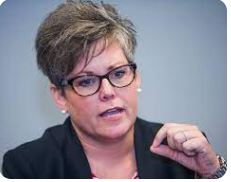Gas Prices become a political football for Gov. Hobbs

VIA AZCAPITIOL TIMES| October 20th, 2023 by Jakob Thorington
Republican lawmakers are blaming Gov. Katie Hobbs for high gasoline prices consumers have paid this year and not taking urgent action to try to reduce costs.
But Hobbs’ office acted no differently than previous governors have in the last two decades, according to Arizona Department of Weights and Measures Regulatory Compliance Administrator Michelle Wilson.
1967 Gas Prices
- Price per gallon (inflation adj.): $0.33 ($1.87)
- Price per barrel (inflation adj.): $2.92 ($16.45)
- U.S. gas consumption: 1.8 billion barrels
- Per capita consumption: 382.5 gallons
- U.S. oil production: 8.8 million barrels per day
- The cumulative rate of inflation since 1967 is 821.5% !!
During a Joint Legislative Ad Hoc Study Committee on Air Quality and Energy hearing on Oct. 16, Wilson told the committee that Hobbs’ office didn’t request a waiver from the Environmental Protection Agency after receiving a letter in March from petroleum refiner HF Sinclair warning of a fuel supply shortage in Arizona.
Wilson said Weights and Measures and the Governor’s Office presented all the information they had about the upcoming fuel shortage to the EPA, but the EPA informed Hobbs that the emergency wasn’t critical enough for a waiver to be granted.
“During the meetings, EPA continued to state that it did not meet the requirements of the Clean Air Act,” Wilson said.
Republicans criticized Hobbs for acting passively because HF Sinclair itself asked the Governor’s Office to seek a waiver in an attempt to allow an alternative fuel type to be brought into the state and avoid price hikes. They also noted this was the first time in five years an energy producer advised the state to request a waiver.
In an Oct. 16 news release, Sen. Sine Kerr, R-Buckeye, said, “Rather than making a case on behalf of Arizonans struggling to fill their tanks with prices hitting $5 per gallon, Governor Hobbs chose to not push back against the EPA and was complicit with the Biden Administration’s pro-inflation, radical environmentalist agenda. “As a result of Hobbs’ inaction, Maricopa County drivers were forced to shell out an extra several hundred million dollars just to get to their destinations during this supply disruption.”
Wilson’s testimony wasn’t new to legislators as The Arizona Republic reported details of Hobbs not requesting a waiver in June. Sen. Jake Hoffman, R-Queen Creek, released a statement on June 16 calling Hobbs incompetent for not seeking a waiver from the EPA.
Waivers have rarely been granted, Wilson said. Requests were considered in 2018, 2019, 2021 and 2022 due to fuel production issues, but no waiver was ever requested, even in 2018 when another oil company requested then-Gov. Doug Ducey’s administration request a waiver.
“I’ve never had a waiver requested in the 12 years that I’ve been here until recently, so it’s very uncommon to request a waiver in my experience,” Wilson said.
She said Hobbs requested a waiver in August and the EPA granted two-one time, 20-day waivers dated on Sept. 1 and Sept. 21. She said the last time she knew of a waiver being granted to the state was in 2003 when a fuel pipeline broke.
Obtaining a waiver usually requires “unforeseen circumstances,” Wilson said. A state would then have to demonstrate that there is a lack of fuel in the area and there’s another fuel that can replace the supply shortage. Pricing isn’t a factor that’s considered for waivers with the Clean Air Act. The September waivers were granted due to pipeline issues and a hurricane, she said.

Sen. Frank Carroll, R-Sun City West, said in a news release that Republicans plan to consider potential policy chances that would prevent the executive branch from not acting or requesting a waiver in a similar scenario.
“It’s clear Governor Hobbs is taking her marching orders from the federal government, instead of serving the best interests of our citizens,” Carroll said in the release.
Another objective of the Oct. 16 committee hearing was to explore alternative fuel blends that could be used in summer and winter months rather than the Cleaner Burning Gasoline that Maricopa County and some other regions of the state have been required to use since the late 1990s.
Weights and Measures, the Division of Environment Quality and the Maricopa Association of Governments explored alternative gasoline standards from 2017 to 2019, but the group was unable to identify a cheaper blend of gasoline with equivalent or better air quality emissions.
But changing fuel standards takes years due to the required technical analyses that must be conducted before EPA approval, said Gordon Schremp, senior energy adviser with Nemequ Analytics and energy policy consultant. He said incorporating a different blend of fuel could be cheaper, but it would bring more regulations that the state would face and may increase fuel costs overall.
“It’s a long process, unfortunately,” Schremp said.
Rep. Mariana Sandoval, D-Goodyear, also told the Arizona Capitol Times that she has been exploring this issue but hasn’t identified any potential alternative blends of fuel to lower gasoline prices after meeting with Hobbs’ office and Weights and Measures.
Gas prices in the region are going down according to an Oct. 16 news release from gasoline study consultant GasBuddy. Prices in Phoenix averaged $4.49 per gallon on Oct. 16, which is nearly 30 cents lower per gallon than prices were a month ago.

Chart of gas prices in by month, nominal and real through 2012















